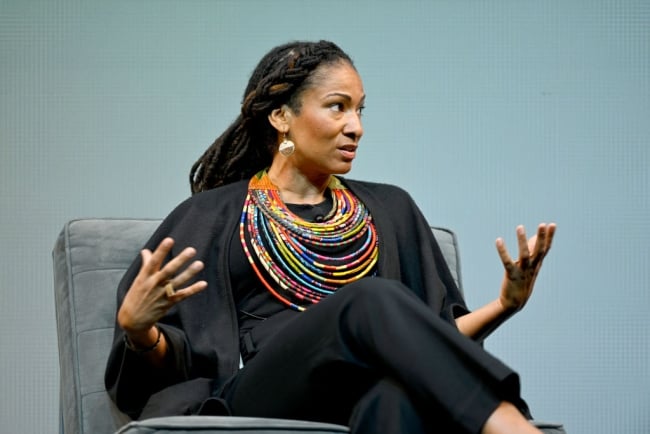You have /5 articles left.
Sign up for a free account or log in.

Ruha Benjamin, a professor of African American studies at Princeton, said her joy about receiving the award was tempered by her university being “slow to respond to students’ demands to disclose and divest from genocidal violence.”
Roy Rochlin/Getty Images
Numerous academics are among the 22 fellows who received an $800,000 grant from the MacArthur Foundation on Tuesday, which they can spend over the next five years on a project of their choosing.
Commonly known as the “genius” grant, the award is typically cause for celebration and pride among both winners and their affiliated institutions. But in at least one case this year, the announcement sparked a moment of conflict stemming from the discord that’s played out on college campuses since the Israel-Hamas war began a year ago.
Princeton University published a news release announcing that Ruha Benjamin, a professor of African American studies, received a 2024 MacArthur fellowship for “illuminating how technology reflects and reproduces social inequality and championing the role of imagination in social transformation.”
However, the announcement didn’t include any direct quotes from Benjamin because, as she wrote on X Tuesday afternoon, she asked the university to “accurately recount my response” to its question about her immediate reaction to finding out about the award—or “not quote me at all.”
Benjamin instead posted on X screenshots of her original response to that question and others, which included references to her stance on the war in the Middle East.
“What would have been a moment of pure joy and excitement was tempered by the sense that the same institutions that are quick to celebrate our accomplishments have been slow to respond to students’ demands to disclose and divest from genocidal violence,” Benjamin wrote. “In fact, the date of the award announcement coincides with a court date for Princeton students who engaged in a campus sit-in last spring. I plan to ‘celebrate’ the award by showing up to court.”
Like many colleges and universities over the past year, Princeton has grappled with how to balance free speech with campus safety, facing scrutiny from supporters of Israel and Palestine alike; 15 pro-Palestinian protesters who were arrested on Princeton’s campus in April for allegedly violating university policies were due in court yesterday.
Princeton officials declined to comment to Inside Higher Ed about Benjamin’s statements, though in the news release President Christopher L. Eisgruber described her as “a strikingly original and creative thinker, writer, and educator who inspires her students and readers.”
Other Academic Awardees
In addition to Benjamin, the other grant recipients affiliated with higher education institutions include:
- Loka Ashwood, a sociologist at the University of Kentucky, for “shedding light on rural identity and culture, and on the ecological, economic and social challenges facing many rural communities.”
- Jericho Brown, a poet at Emory University, for “reflecting on contemporary culture and identity in works that combine formal experimentation and intense self-examination.”
- Tony Cokes, a professor in the Department of Modern Culture and Media at Brown University, for “creating video works that recontextualize historical and cultural moments.”
- Nicole Dell, a computer and information scientist at Cornell Tech, for “developing technology interventions to address the specific needs and concerns of overlooked populations, in particular survivors of intimate partner violence and home healthcare workers.”
- Jennifer Morgan, a historian at New York University, for “deepening understanding of how the exploitation of enslaved women enabled the institutionalization of race-based slavery in early America and the Black Atlantic.”
- Martha Muñoz, an evolutionary biologist at Yale University, for “investigating the factors that influence rates and patterns of evolution.”
- Shailaja Paik, a historian at the University of Cincinnati, for “exploring the intersection of caste, gender, and sexuality in modern India through the lives of Dalit women.”
- Joseph Parker, an evolutionary biologist at the California Institute of Technology, for “uncovering the origins of symbiosis in rove beetles and the evolution of complex organismal traits.”
- Dorothy Roberts, a legal scholar and public policy researcher at the University of Pennsylvania, for “exposing racial inequities embedded in social service systems and uplifting the experiences of people caught up in them.”
- Keivan G. Stassun, a scientist and educator at Vanderbilt University, for expanding opportunities in STEM for underrepresented populations.








